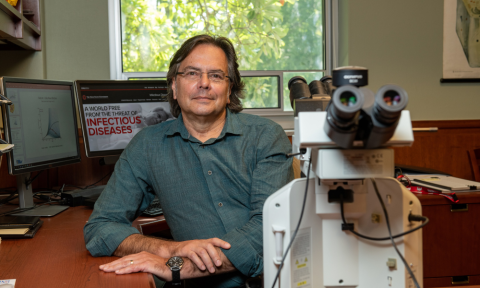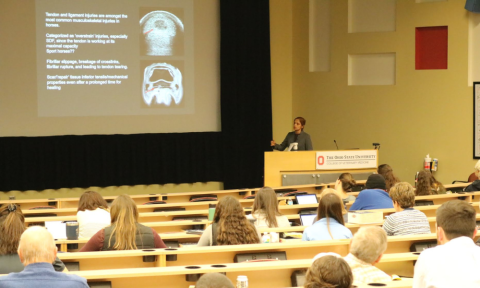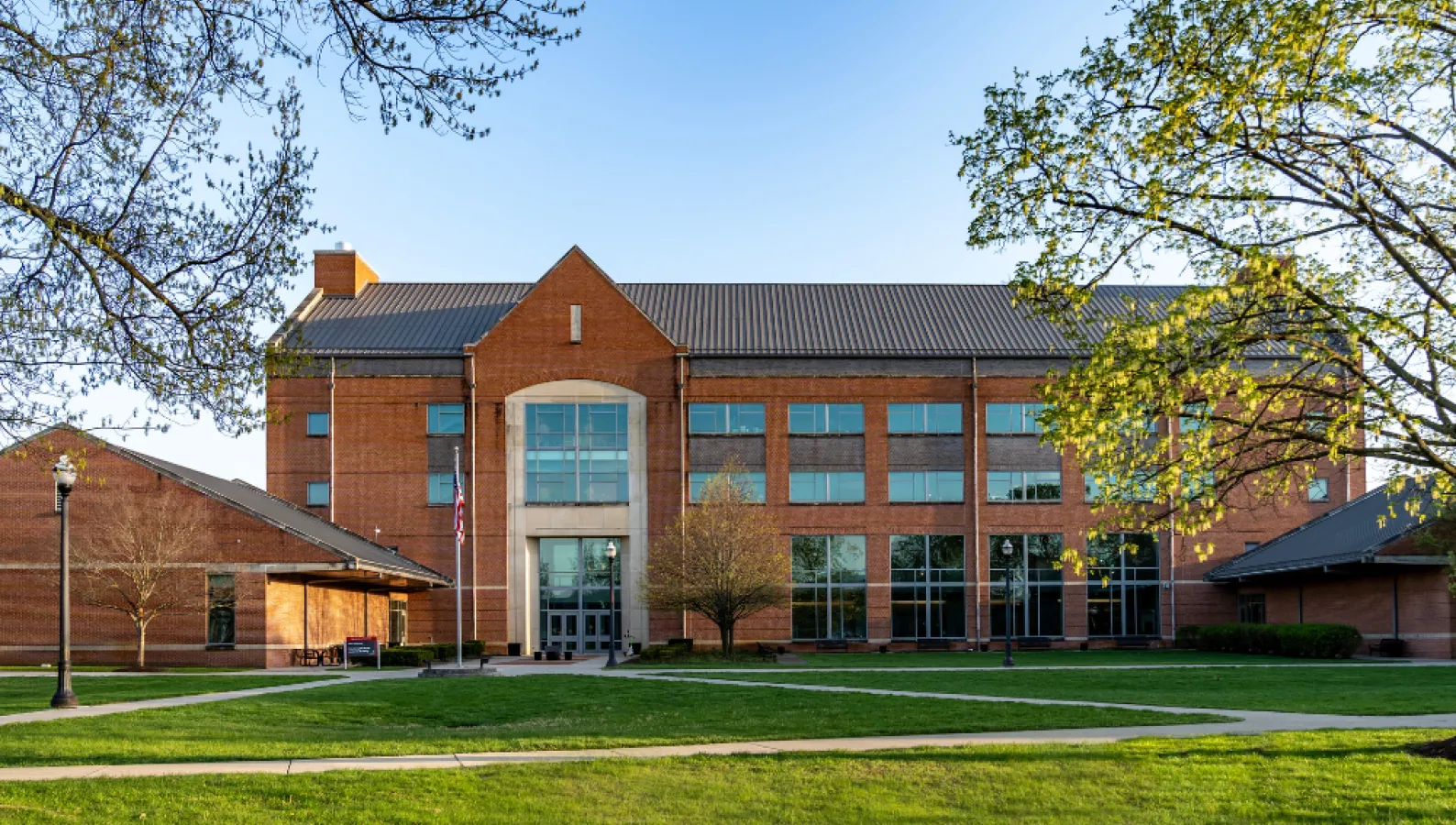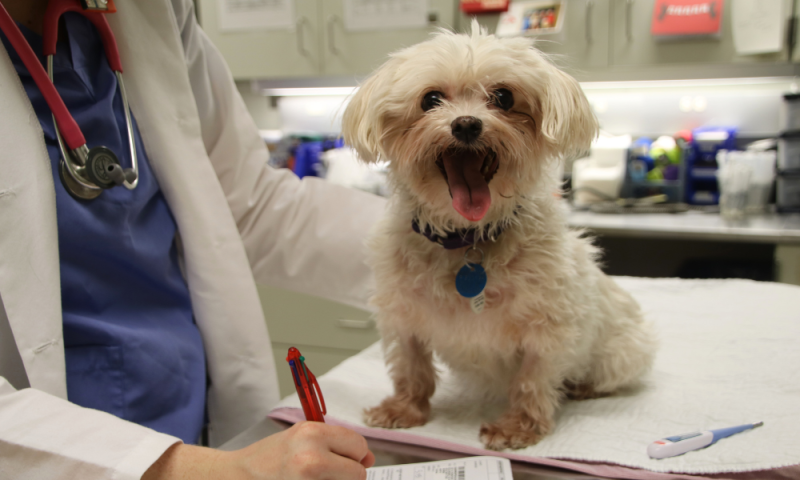Infectious Disease

The Infectious Disease Signature Program works to control the spread and severity of infectious diseases through the creation and dissemination of knowledge, practices and products. The strategy uses multidisciplinary active networks in high-impact programmatic areas to implement its mission. These programmatic areas, grounded in the College of Veterinary Medicine, represent a key component of a larger collaborative network that includes faculty, staff and students in the colleges of Medicine, Nursing, Public Health, Pharmacy, Arts and Sciences, and Food, Agriculture and Environmental Sciences, in addition to the infectious disease community of the Research Institute at Nationwide Children’s Hospital.
Faculty Leadership: Dr. Michael Oglesbee, professor, Department of Veterinary Biosciences, Director, Ohio State’s Infectious Disease Institute
Faculty Leadership: Dr. Tom Wittum, professor and chair, Department of Veterinary Preventive Medicine
Faculty are part of an integrated campus-wide effort to understand antimicrobial use and resistance, and to implement meaningful guidelines for antimicrobial stewardship and resistance surveillance to be applied by all colleges at The Ohio State University with clinical or related activities, supported by both clinical and basic research and a standardized curriculum. Genomic characterization of bacterial isolates is a foundation for understanding resistance mechanisms, drug discovery, and alternatives to the use of antibiotics. Activities are aligned with the five specific goals for the National Strategy to Combat Antibiotic Resistance, and coordinated by an Antimicrobial Stewardship Faculty Leadership group.
Faculty Leadership: Dr. Shan-Lu-Liu, professor and director, Viruses and Emerging Pathogens Program, Ohio State Infectious Diseases Institute and Dr. Linda Saif, professor, Department of Veterinary Preventive Medicine
The majority of emerging and re-emerging viral pathogens are RNA viruses, representing significant threats to both human and animal health. This program area builds upon strengths of the university Center for Retrovirus Research (CRR) that is based in the College of Veterinary Medicine, and the Food Animal Health Research Program at the Ohio Agricultural Research and Development Center. Pathogenesis and immunity to infections by retroviruses and other RNA viral pathogens, particularly those of the respiratory and gastrointestinal systems, are major focus areas, with goals of developing novel antiviral treatment strategies and vaccines. The programmatic area is supported by seminar series through the CRR, Viruses and Emerging Pathogens, and the Ohio Virology Association.
Faculty Leadership: Dr. Prosper Boyaka, professor and chair, Department of Veterinary Biosciences
The cell, tissue and physiologic responses to infection, basic determinants of immunity, and the role of microbiomes in host defense and mucosal immunity is the focus of this programmatic area, emphasizing the host perspective on antimicrobial treatment and prevention strategies. Research efforts are synergistic with programmatic areas of (1) Antimicrobial Resistance, and (2) Viruses and Emerging Pathogens. Research in cell biology has been central to studies of viral and bacterial pathogenesis, including work in the Ehrlichia Research Laboratory.
Faculty Leadership: Dr. Rebecca Garabed, professor, Department of Veterinary Preventive Medicine
Control of infectious diseases requires an understanding of disease ecology – the relationships between animal and human hosts, their pathogens and the surrounding environment. This programmatic area is focused upon infectious disease ecology and epidemiology which includes the studies of emerging and zoonotic diseases, environmental microbiology, and transmission of pathogenic bacteria through the food chain (i.e. food safety). These areas are synergistic with programmatic areas of (1) Antimicrobial Resistance Mechanisms, and (2) Pathobiology, Treatment and Prevention of Virus Infection. Support is provided by the Animal Influenza Ecology and Epidemiology Research Program, the Disease Ecology and Computer Modeling Laboratory, and the Infectious Diseases Molecular Epidemiology Laboratory.
Comparative and Translational Oncology
The Comparative and Translational Oncology Signature Program works to advance the care and treatment of animals and people with cancer through interdisciplinary collaborative research efforts within the college, the Ohio State biomedical community, and nationwide. This is accomplished by the development of enhanced diagnostic capabilities, implementation of clinical trials that involve novel therapeutics, and integration of translational genomic and medicine efforts. The program impacts key areas of research, clinical service and teaching within the college and across the University and serves as a centralized effort to drive improved outcomes in both veterinary and human patients.
Faculty leadership: Dr. Laura Selmic, associate professor, Department of Veterinary Clinical Sciences
Membership and participation in the program is open to anyone with an interest in comparative and translational oncology and participants include individuals from the Colleges of Medicine, Pharmacy, Engineering (among others), and Nationwide Children’s Hospital, as well as from the college. Collaborative research is a major component of the Signature Program that drives the identification and validation of new targets for therapy, ultimately providing enhanced opportunities for translational clinical trials. Two shared resources provide support for the program: the Blue Buffalo Clinical Trials Office/Biospecimen Repository, also known as the Veterinary Clinical Research Support Shared Resource (VCRSSR, supported by the OSU Comprehensive Cancer Center and Center for Clinical and Translational Sciences) and the Comparative Pathology and Mouse Phenotyping Shared Resource (CPMPSR).
The clinical component of the Oncology Signature Program is supported by the Integrated Oncology Service that incorporates medical, radiation and surgical oncology specialists to provide enhanced patient care by simultaneously leveraging expertise across multiple aspects of oncologic therapy. Additionally, care of veterinary patients with cancer is enhanced through the conduct of comparative and translational clinical trials, supported by the VCRSSR. These studies generate critical data that support the development of new diagnostics and therapeutics for that impact outcomes in both veterinary and human oncology.
The Oncology Signature Program serves as an incubator for training of graduate students and professional (DVM) students through a formal journal club, graduate class dedicated to comparative and translational oncology, and support of various seminar series. Additionally, professional students receive advanced training in the evaluation and treatment of veterinary cancer patients through rotations on the Integrated Oncology Service.
Neuromusculoskeletal Science

The Consortium for Advancement of Neuromusculoskeletal Science (NMS) and Locomotion (CANSL) Regeneration & Recovery (R&R) works to advance the care and treatment of patients with locomotion diseases through collaborative research.
Faculty Leadership: Dr. Sushmitha Durgam, associate professor-tenure, Department of Veterinary Clinical Sciences
Membership and participation in the program is open to anyone with an interest in Neuromusculoskeletal science and locomotion and regenerative medicine. Members and participants include individuals from the CVM, the College of Medicine, and The Jameson Crane Sports Medicine Institute, and the Department of Orthopedics.
Locomotor abnormality is the number one complaint in the Galbreath Equine Center, and one of the most common presentations for the small animal orthopedic and neurology services in the Small Animal Hospital. Diseases associated with this complaint constitute a significant hurdle to quality of life in our companion animals, but also represent an opportunity for comparative and translational studies for advancements in disease management. The VMC boasts boarded specialists in Surgery (DACVS – SA & LA), Neurology (DACVIM – Neurology), and Sports Medicine (DACVSMR – Canine & Equine) to assist in the diagnosis and treatment of these diseases.
CANSL funds seed grants for research in the area of NMS and regenerative medicine, enabling researchers to work together collaboratively on pilot projects furthering the mission of CANSL.
Currently Funded Projects
- Development of an Anterior Cruciate Ligament Allograft Biofilm Rabbit Model. - PI Nina Kieves
- Measurement of Canine Knee Kinematics Outside the Lab: A Wearables Approach. - PI Asimina Kiourit
Current research being conducted by CANSL leadership include:
- Effect of Extracorporeal Shockwave Therapy on Lumbosacral Pain in Dogs
- Comparison of Preoperative Analgesic Protocols and Evaluation of Chronic Neuropathic Pain States in Dogs Undergoing TPLO
- Measuring and Treating Neuropathic Pain in a Natural Animal Disease Model of Syringomyelia
- Biomechanical Comparison of Four Pin and Tension Band Configurations
- An In-Vivo Comparison of Meniscal Pathology Evaluation Pre and Post-Tibial Plateau Leveling Osteotomy
- Clinical Features of Spinal Shock in Acute Canine Spinal Cord Injury
- Differential Distribution and Regulation of Elastin in Equine Deep Digital Flexor Tendon
- The Effect of Platelet-rich Plasma in Conjunction with Antibiotics for the Treatment of Septic Arthritis in Calves
- Quantitative Measures of Spasticity in Dogs with Acute Spinal Cord Injury

